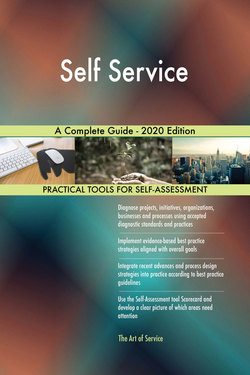Читать книгу Self Service A Complete Guide - 2020 Edition - Gerardus Blokdyk - Страница 7
На сайте Литреса книга снята с продажи.
ОглавлениеCRITERION #1: RECOGNIZE
INTENT: Be aware of the need for change. Recognize that there is an unfavorable variation, problem or symptom.
In my belief, the answer to this question is clearly defined:
5 Strongly Agree
4 Agree
3 Neutral
2 Disagree
1 Strongly Disagree
1. How are the Self-service’s objectives aligned to the group’s overall stakeholder strategy?
<--- Score
2. Why can chatbots facilitate an employees self-service needs?
<--- Score
3. What is the problem or issue?
<--- Score
4. Are there any specific expectations or concerns about the Self-service team, Self-service itself?
<--- Score
5. Do you know if your current self-service strategy is meeting customer and contact center needs and demands?
<--- Score
6. What is the extent or complexity of the Self-service problem?
<--- Score
7. Will a response program recognize when a crisis occurs and provide some level of response?
<--- Score
8. How much of reporting needs are self-service or automated?
<--- Score
9. Are there any revenue recognition issues?
<--- Score
10. Do you need Self-Service BI?
<--- Score
11. What are the Self-service resources needed?
<--- Score
12. What Self-service problem should be solved?
<--- Score
13. What must it do for airlines to better recognize customers?
<--- Score
14. How do you take a forward-looking perspective in identifying Self-service research related to market response and models?
<--- Score
15. Would you recognize a threat from the inside?
<--- Score
16. Why does it still need a self-service it catalog?
<--- Score
17. How to identify customer pain points which can be transformed into Self-Service options driving excellent Customer Experience?
<--- Score
18. How can auditing be a preventative security measure?
<--- Score
19. Who are the users who need self-service?
<--- Score
20. Do your managers want or need self-service access to relevant KPIs?
<--- Score
21. What is needed for self-service?
<--- Score
22. Will Self-service deliverables need to be tested and, if so, by whom?
<--- Score
23. Are your goals realistic? Do you need to redefine your problem? Perhaps the problem has changed or maybe you have reached your goal and need to set a new one?
<--- Score
24. What do you need to know to achieve the objective?
<--- Score
25. What are the expected benefits of Self-service to the stakeholder?
<--- Score
26. What are the key considerations that you need to keep in mind to ensure that your self-service can be a success?
<--- Score
27. Do external users need to have self-service password reset?
<--- Score
28. How many users do you need for Web Self-Service and Customer Self-Service?
<--- Score
29. How are you going to measure success?
<--- Score
30. How much are sponsors, customers, partners, stakeholders involved in Self-service? In other words, what are the risks, if Self-service does not deliver successfully?
<--- Score
31. As a sponsor, customer or management, how important is it to meet goals, objectives?
<--- Score
32. When a Self-service manager recognizes a problem, what options are available?
<--- Score
33. Is the need for organizational change recognized?
<--- Score
34. What would happen if Self-service weren’t done?
<--- Score
35. What prevents you from making the changes you know will make you a more effective Self-service leader?
<--- Score
36. What sort of knowledge does your organization need?
<--- Score
37. What needs to stay?
<--- Score
38. What problems are you facing and how do you consider Self-service will circumvent those obstacles?
<--- Score
39. What are the minority interests and what amount of minority interests can be recognized?
<--- Score
40. Where do you need to exercise leadership?
<--- Score
41. What do you need to start doing?
<--- Score
42. What situation(s) led to this Self-service Self Assessment?
<--- Score
43. When the customers role as value creator is recognized, what is the role of suppliers?
<--- Score
44. Do you need self-service machine provisioning?
<--- Score
45. Which barriers, if any, prevent your organization from sharing full context and information from self-service channels to voice channels?
<--- Score
46. To what extent does each concerned units management team recognize Self-service as an effective investment?
<--- Score
47. Do you need different information or graphics?
<--- Score
48. What existing digital signage systems are in place that content needs to be migrated from?
<--- Score
49. Why do you need Self-Service BI?
<--- Score
50. What Self-service events should you attend?
<--- Score
51. Who else hopes to benefit from it?
<--- Score
52. What are the signs that your organization needs self-service support?
<--- Score
53. When you have problems with internet self-service which help would you prefer?
<--- Score
54. What does Self-service success mean to the stakeholders?
<--- Score
55. Does the knowledge management module include a rules engine for the purpose of defining event triggers?
<--- Score
56. What are the stakeholder objectives to be achieved with Self-service?
<--- Score
57. Are employees recognized for desired behaviors?
<--- Score
58. What is the Self-service problem definition? What do you need to resolve?
<--- Score
59. Are cases still coming in about an issue that should be resolved with a Support Action in self-service?
<--- Score
Add up total points for this section: _____ = Total points for this section
Divided by: ______ (number of statements answered) = ______ Average score for this section
Transfer your score to the Self-service Index at the beginning of the Self-Assessment.
